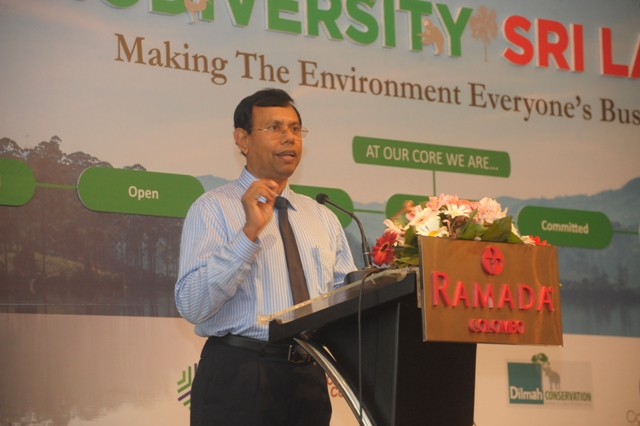Dr Ananda Mallawatantri, Country Representative of IUCN addresses the Annual General Meeting of Biodiversity Sri Lanka (BSL)
Biodiversity Sri Lanka (BSL) is a private sector platform with more than 60 companies. Established in with the support of Ceylon Chamber of Commerce (CCC), IUCN and Dilmah Conservation, BSL is focusing on national priorities that would set higher standards for Sri Lanka’s private sector on conservation of valuable biological heritage. Based in CCC, BSL is the successor to the former Sri Lanka Business and Biodiversity Platform. BSL is a member of the Global Partnership on Business and Biodiversity of the Convention on Biological Diversity (CBD).

Dr Ananda Mallawatantri speaking on the elements of the KRMP approach
Photo: Biodiversity Sri Lanka
As a part of the services offered to membership, BSL developed a comprehensive technical database, carrying information on expertise available in diverse and relevant subject areas. Conservation-related requirements of businesses are channeled to the intellectual mainstream and academia through this database. Knowledge of best practices, information on new biodiversity literature and technology developments have been disseminated through BSL organized workshops and learning events. BSL also recognizing the outstanding corporate contributions to biodiversity conservation.
As one of major initiatives providing room for many agencies to come together, in 2016, the Board of Management of BSL decided to promote the Kelani River Multi-Stakeholder approach developed by IUCN with the support of over 25 Govt. agencies and Private Sector. The News Letter released close to the 2016 Annual General Meeting of BSL carried a number of articles on the KRMP approach.
Expanding on the same, during the Annual General Meeting that was held on 30 September 2016 at Ramada Colombo, Dr Ananda Mallawatantri, Country Representative of IUCN Sri Lanka spoke on the elements of the KRMP approach. Kelani River Basin is the home for 25% Sri Lankans, it provides drinking water for millions of people, with large pollution potentials from over 10,000 industries. KRMP approach was designed to provide a base to attract stakeholder groups, including the Private Sector companies to work towards restoring the Kelani River to its ancient beauty and usefulness.
In his presentation, Dr. Mallawatantri spoke on the importance of empowering and providing support to Public-Private Partnerships and Public-Private-Community Partnerships to formulate and implement a long-term restoration efforts for the recovery of the Kelani River. He indicated the high potential for the Kelani River Basin recovery to be an excellent model for the National Pavithra Ganga Programme.
